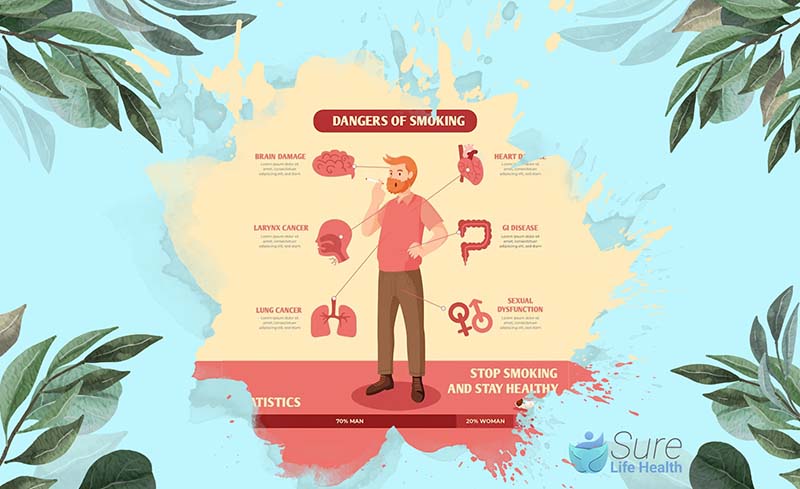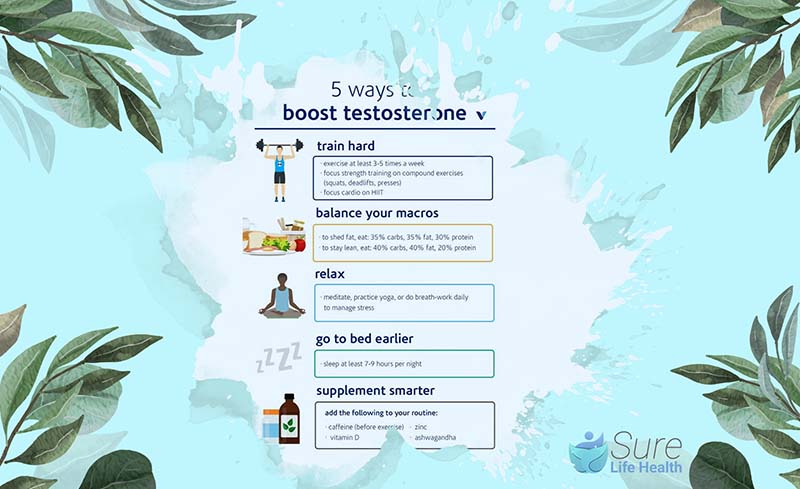Most of us know that smoking is harmful for health, linked to heart problems, breathing issues, and cancer. But new studies have looked into something else: does smoking cigars increase testosterone?
Testosterone, a crucial hormone, plays a pivotal role in muscle development, libido, and overall vitality.
Understanding the relationship between smoking and testosterone levels opens up vital insights into men’s health, potentially shedding light on how lifestyle choices directly influence their well-being and overall health.
Will Quitting Smoking Increase Testosterone?
It might seem logical to assume that quitting smoking could lead to higher or more balanced testosterone levels.
However, it’s crucial to understand that smoking is just one factor among many that influence testosterone levels.
Things like body weight (especially being overweight or obese), diet, and other health conditions also play significant roles in hormonal balance. Research suggests that overweight or obese men may still struggle with hormone balance even after quitting smoking. Surprisingly, some studies indicate that high-protein diets might even decrease testosterone levels in men.
Additionally, if you’re dealing with other health issues or chronic conditions, your hormone levels could be affected as your body prioritizes your overall health over hormonal balance. So, while quitting smoking is definitely a positive step for your health, it’s important to consider other factors that could impact your testosterone levels too.

Scientific Evidence Shows That Smoking Increases Testosterone
Scientific investigations into the impact of smoking on testosterone levels yield varied results. Some studies indicate that smoking may lead to short-term increases in testosterone levels, with smokers showing higher total testosterone levels compared to non-smokers.
However, it’s important to understand that these increases are not significant enough to cause noticeable changes or improvements in symptoms related to testosterone levels.
Despite this short-term effect, smoking is widely acknowledged as harmful to overall health, including hormonal health. It’s strongly discouraged as a method to boost testosterone levels due to its numerous adverse effects on the body.
Additionally, while some research suggests a slight decrease in testosterone levels after quitting smoking, the long-term benefits of quitting far outweigh this temporary decline in hormone levels.
Consumers are urged to consider the significant health risks associated with smoking and to prioritize quitting to safeguard their well-being and ensure long-term health benefits.

Does Smoking Affect Other Hormones?
While there’s evidence suggesting that smoking might influence testosterone levels, it’s crucial to understand that smoking can also affect other hormones in the body.
For instance, smoking has been found to raise cortisol levels. Cortisol is a hormone involved in the stress response, and chronically elevated levels can contribute to various health issues.
Moreover, smoking has been associated with reduced estrogen levels in women. This occurs because smoking alters the liver’s metabolism of estrogen, resulting in lower circulating levels of this hormone.
Additionally, smoking can interfere with insulin production and sensitivity, increasing the risk of diabetes.
It’s evident that smoking can have broad effects on hormones beyond just testosterone. Quitting smoking remains one of the most beneficial steps you can take for your overall health and well-being, regardless of its specific impact on any individual hormone.

How Does Smoking Cessation Affect Testosterone?
While the connection between smoking and testosterone levels is complex, evidence strongly suggests that quitting smoking positively affects hormone levels.
A study in the Journal of Sexual Medicine discovered that men who quit smoking experienced a notable increase in testosterone levels within just one week. This increase persisted over six months, indicating a sustained effect.
Another study, featured in the British Journal of Urology International, revealed that men who quit smoking exhibited higher testosterone levels compared to those who continued smoking. Researchers suggested that smoking-induced damage to testicular cells might lead to decreased testosterone production.
It’s important to recognize that while quitting smoking may result in increased testosterone levels, addressing other lifestyle factors like diet and exercise habits is equally crucial. These factors also influence hormone production and overall health.
If you’re a smoker looking to improve your health and testosterone levels, taking the step to quit smoking is a crucial beginning. Consult your doctor for strategies to quit smoking and address other lifestyle factors that could impact your hormone levels.
How to Increase Testosterone Naturally Without Smoking
While smoking might have the potential to increase testosterone levels, the associated health risks far outweigh any potential benefits. Thankfully, several other strategies can boost testosterone production without resorting to smoking.
- Exercise regularly: Engaging in regular exercise, especially resistance training, has been proven to elevate testosterone levels in both men and women.
- Maintain a healthy diet: Consuming a well-balanced diet rich in protein, healthy fats, and nutrient-dense foods supports hormone production.
- Prioritize sleep: Aim for 7-8 hours of quality sleep each night, as adequate sleep is crucial for hormone regulation, including testosterone production.
- Manage stress: Chronic stress can increase cortisol levels, which negatively impacts testosterone production. Incorporate stress-reducing activities like yoga or meditation into your routine.
- Consider supplements: Certain supplements such as vitamin D, zinc, and magnesium have demonstrated support for healthy testosterone levels.
By integrating these lifestyle strategies, you can naturally support healthy hormone production without resorting to smoking or other risky behaviors. If you have concerns about your testosterone levels or overall health, consult your doctor for additional tailored strategies.

FAQs
How Long Does Nicotine Affect Sperm?
Nicotine can impact sperm quality immediately and in the long term, affecting motility, morphology, and overall count.
The duration of nicotine’s effect on sperm varies, but studies suggest it can persist as long as nicotine use continues.
Sperm generation cycles take about 74 days, so changes from nicotine exposure could potentially reverse after cessation over several months, assuming no other health issues.
Does Smoking Cigars Increase Testosterone?
Studies show conflicting results regarding the impact of smoking on testosterone levels. Individual differences and factors like age, diet, exercise habits, and lifestyle play roles.
Regardless, the health risks of smoking far outweigh any potential benefits, including decreased fertility and sexual health issues.
Does Weed Lower Sperm Count?
Regular cannabis use can lower sperm count and motility due to THC, the psychoactive component. The extent of impact depends on frequency and amount of use.
Is Nicotine Good for Testosterone?
Nicotine isn’t beneficial for testosterone. Research suggests nicotine exposure can harm the endocrine system, responsible for hormone production, including testosterone.
Chronic nicotine use may lead to lower testosterone levels.
Conclusion
While it’s true that smoking might temporarily boost testosterone levels, the long-term health risks far outweigh any short-lived benefits. Kicking the habit not only paves the way for a longer, more joyful life but also supports maintaining healthy testosterone levels naturally through diet and exercise.
Furthermore, quitting smoking enhances sexual experiences and boosts overall vitality, offering you a life unburdened by the adverse effects of smoking. In addition to these benefits, quitting smoking is crucial to avoid numerous severe health complications down the line.
Remember, making the choice to quit smoking today is not just a step towards better health—it’s a leap towards a healthier, more vibrant life.
Be sure to explore more insightful blogs from Sure Life Health, where we continue to shed light on the latest trends and breakthroughs in health and wellness.
Professor Gaye Cunnane, PhD, MB, FRCPI
As the Director of Health and Wellbeing at RCPI, Professor Gaye Cunnane is at the helm of initiatives aimed at enhancing the health and well-being of RCPI Trainers and Trainees. Her role extends beyond administration; she is also a respected clinical professor of rheumatology and a consultant rheumatologist at Trinity College Dublin (TCD) and St James’s Hospital. Prof. Cunnane’s medical journey began at TCD, where she graduated from medical school, and her path has been marked by both clinical and academic excellence.
After completing her basic clinical training in medicine, she embarked on PhD studies at University College Dublin and St Vincent’s University Hospital. Her research during this period was focused on prognostic markers in early inflammatory arthritis, a project that saw her collaborating with esteemed universities across Europe, including in Switzerland, The Netherlands, the UK, and Sweden.
Prof. Cunnane’s career took her to the University of California, San Francisco, where she spent three years delving into research on new treatments for lupus. Her academic prowess led her to the University of Leeds in 2001 as a senior lecturer, before returning to Ireland in 2003 to assume her current roles. She has also served as the National Specialty Director for Rheumatology training in Ireland, Programme Director for Basic Specialist Training with RCPI, and as a past President of the Irish Society for Rheumatology.
PUBLISHED ARTICLES
“Rheumatic disease differentiation using immunoglobulin G sugar printing by high-density electrophoresis”: Published in The Journal of Rheumatology, this study reflects her in-depth investigation into rheumatic diseases.
“Benefits of exercise in patients with rheumatoid arthritis: a randomized controlled trial”: This research work, highlighting the positive impact of exercise on rheumatoid arthritis, underscores Prof. Cunnane’s dedication to practical, patient-centered research.
Additionally, Prof. Cunnane has made notable contributions to the Annals of the Rheumatic Diseases, discussing early referral, diagnosis, and treatment of rheumatoid arthritis. She has also been involved in a study on the NCBI platform investigating exercise benefits in rheumatoid arthritis patients.
Professor Gaye Cunnane’s career is a testament to her commitment to improving patient outcomes in rheumatology through rigorous research, clinical excellence, and dedicated teaching. Her work continues to influence the field of rheumatology, both in Ireland and internationally.

